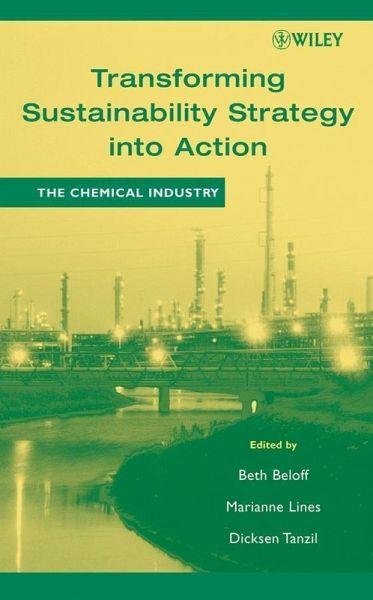
Transforming Sustainability Strategy into Action (eBook, PDF)
The Chemical Industry
Redaktion: Beloff, Beth; Tanzil, Dicksen; Lines, Marianne
Versandkostenfrei!
Sofort per Download lieferbar
144,99 €
inkl. MwSt.
Weitere Ausgaben:

PAYBACK Punkte
0 °P sammeln!
"A highly informative and brilliant contribution to the growing sustainability literature." -Dr. Brian and Mary Nattrass Managing Partners of Sustainability Partners and authors of The Natural Step for Business and Dancing with the Tiger The goal of sustainable development, a recent focus in the corporate world, is to "ensure a better quality of life for everyone today and in generations to come." The challenge facing industry leaders is how to reconcile economically competitive strategies with environmentally sound and socially responsible practices. Transforming Sustainability Strategy into ...
"A highly informative and brilliant contribution to the growing sustainability literature." -Dr. Brian and Mary Nattrass Managing Partners of Sustainability Partners and authors of The Natural Step for Business and Dancing with the Tiger The goal of sustainable development, a recent focus in the corporate world, is to "ensure a better quality of life for everyone today and in generations to come." The challenge facing industry leaders is how to reconcile economically competitive strategies with environmentally sound and socially responsible practices. Transforming Sustainability Strategy into Action: The Chemical Industry presents proven practical techniques to help managers in the chemical industry identify and assess options for improving the sustainability of their organizations, with a pragmatic emphasis on operational aspects, decision support, and guidelines for measuring progress. Employing a systematic approach and introducing globally proven problem-solving and decision-making tools designed to provoke questioning and creative thinking, the authors address some of the most challenging issues for the industrial world today. The authors' combined expertise and extensive experience in translating sustainability strategies from theory into action make them uniquely qualified to deliver the kind of hands-on, responsive business solutions that will give corporate leaders the competitive edge in preparing for tomorrow's socially and environmentally conscious marketplace.
Dieser Download kann aus rechtlichen Gründen nur mit Rechnungsadresse in A, B, BG, CY, CZ, D, DK, EW, E, FIN, F, GR, HR, H, IRL, I, LT, L, LR, M, NL, PL, P, R, S, SLO, SK ausgeliefert werden.












